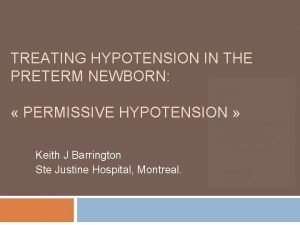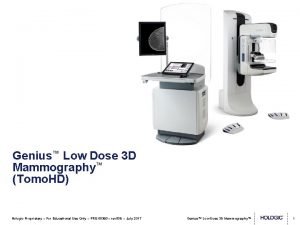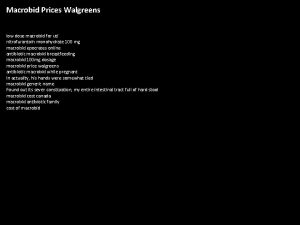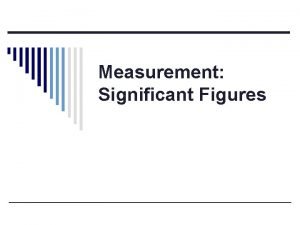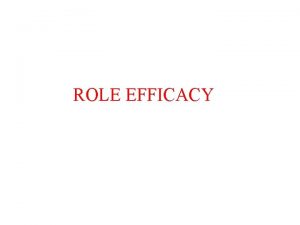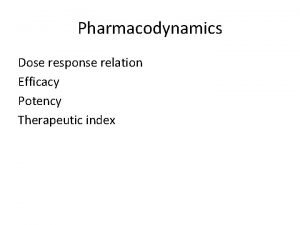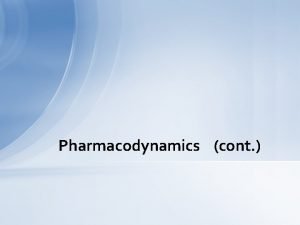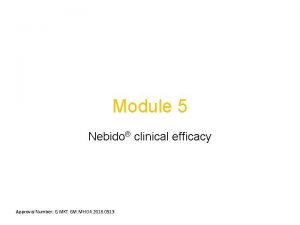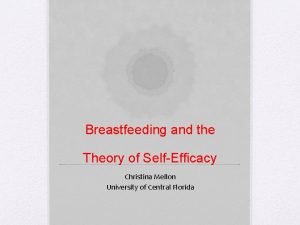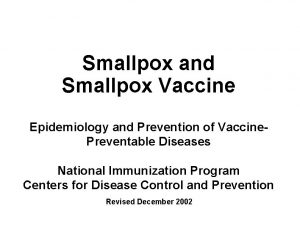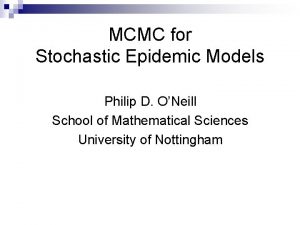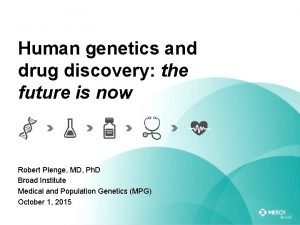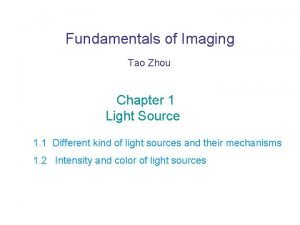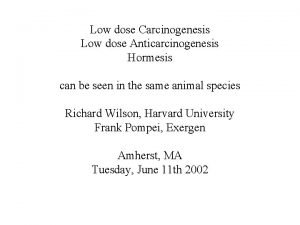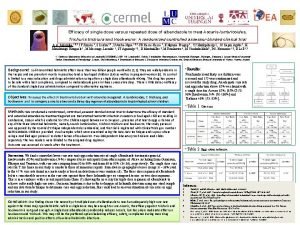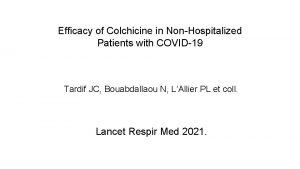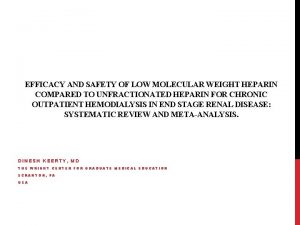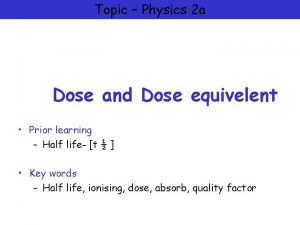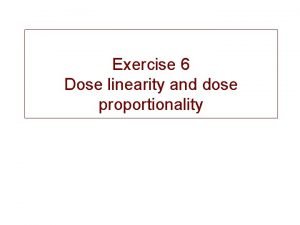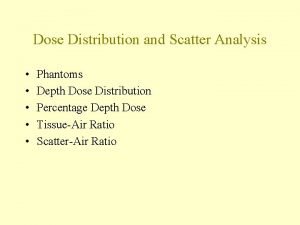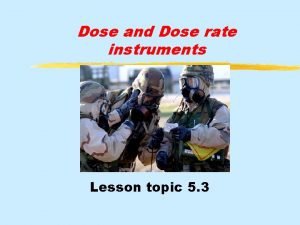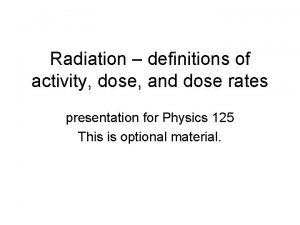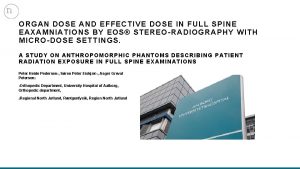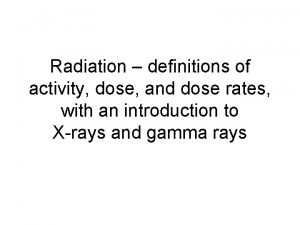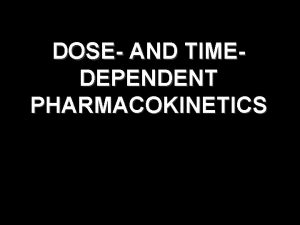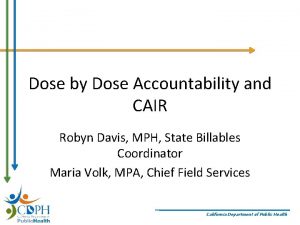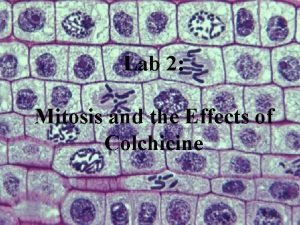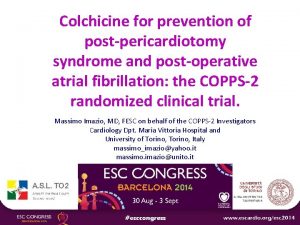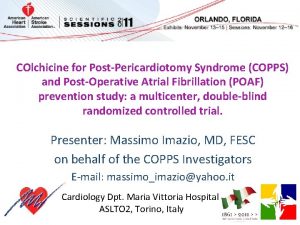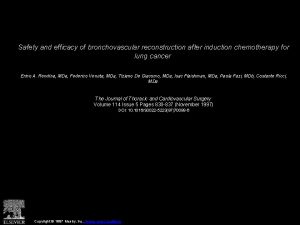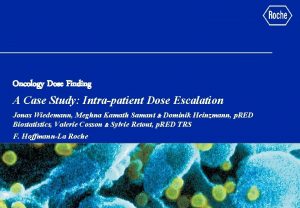Efficacy and Safety of Low Dose Colchicine after
























- Slides: 24

Efficacy and Safety of Low. Dose Colchicine after Myocardial Infarction NEJM November 16, 2019 DOI: 10. 1056/NEJMoa 1912388

INTRODUCTION • Inflammation appears to play an important role in atherosclerosis. • Inhibition of interleukin-1β by canakinumab led to a 15% lower risk of cardiovascular events than was observed with placebo in the Canakinumab Antiinflamatory Thrombosis Outcomes Study (CANTOS). • Also led to a slightly higher incidence of fatal infections. • However, methotrexate did not affect cardiovascular outcomes or plasma markers of inflammation in the Cardiovascular Inflammation Reduction Trial (CIRT).

INTRODUCTION • In light of these differing results and given than canakinumab has not been approved for cardiovascular prevention, the search for a widely used alternative anti-inflammatory treatment that may reduce the risk of atherosclerotic events among patients with coronary artery disease continues.

COLCHICINE • Is an inexpensive, orally administered, potent anti-inflammatory medication. • Initially extracted from the autumn crocus and has been used for centuries. • Mechanism of action: inhibition of tubulin polymerization and microtubule generation, and possibly effects on cellular adhesion molecules, inflammatory chemokines, and the inflammasome. • Currently indicated for the treatment of: • Pericarditis

COLCHICINE • In the Low-Dose Colchicine (Lo. Do. Co) trial, patients with stable coronary disease treated with colchicine at a dose of 0. 5 mg once daily had fewer cardiovascular events than those not receiving colchicine. • However, that trial only enrolled 532 patients, and was not placebocontrolled.

COLCOT • Colchicine Cardiovascular Outcomes Trial (COLCOT) • Aim: to evaluate the effects of colchicine on cardiovascular outcomes as well as it’s long-term safety profile in patients who had recently had a myocardial infarction. • Randomised, double-blind, placebo-controlled, investigator-initiated trial. • Patients were assigned in a 1: 1 ratio to receive either colchicine (0. 5 mg daily) or placebo. • Clinical evaluation occurred at 1 month and 3 months after randomization and every 3 months thereafter.

ENDPOINTS • Primary Efficacy End Point • Composite of death from cardiovascular causes, resuscitated cardiac arrest, MI, stroke, or urgent hospitalisation for angina leading to coronary revascularisation in a time-to-event analysis. • Secondary End Points • Components of the primary efficacy end point • Composite of death from cardiovascular causes, resuscitated cardiac arrest, MI or stroke. • Total mortality • Exploratory End Points • Coronary revascularisation • Hospitalisation for heart failure • AF • DVT or PE • Change from baseline to 6 months in hs. CRP • change from baseline to 12 months in WCC count.



• Trial enrollment began in Dec 2015, and was completed in August 2018. • Last trial visit was in July 2019. • Followed up for a median of 22. 6 months.


END OF TRIAL • At the end of the trial, the trial regimen had been discontinued in 18. 4% of patients in the colchicine group and 18. 7% in the placebo group. • Among the patients who discontinued the trial regiman, median duration of receipt of the trial drug was • • 7. 1 months in the colchicine group 6. 1 months in the placebo group • Overall, the median duration of receipt of the trial drug was • • 19. 6 months in the colchicine group 19. 5 months in the placebo group



BIOMARKERS OF INFLAMMATION • hs. CRP was measured in a subgroup of only 207 patients at the time of randomization and 6 months later. • • • Median concentration at trial entry was 4. 28 mg/L. • The adjusted geometric mean percent changes in the hs. CRP level at 6 months after MI was -70% in the colchicine group and -66. 6% in the placebo group. Baselines characteristics were similar to the overall population. However, the small and selected subgroup with these data limits the interpretation of these analyses.

BIOMARKERS OF INFLAMMATION • Information about white cell counts at baseline and at the 12 -month follow-up were also available for a relatively small subgroup of 1972 patients. • The adjusted geometric mean percent changes from baseline to 1 year in the total WCC were -18. 8% in the colchicine group and -19. 0% in the placebo group, with no significant difference between the groups.


DISCUSSION • In COLCOT, the risk of primary composite efficacy end point of death from CV causes, resuscitated cardiac arrest, MI, stroke, or urgent hospitalisation for angina leading to coronary revasc, as assessed in a time-to-event analysis, was significantly lower among the patients who were randomly assigned to receive 0. 5 mg of colchicine daily, than among those who received a placebo. • This result was due predominantly to a lower incidence of strokes and urgent hospitalisations for angina leading to coronary revascularisation.

DISCUSSION • Results were observed against a background of appropriate medications • • Aspirin, a different antiplatelet agent, and a statin, in 98 to 99% of patients. In addition, PCI was performed in 93% of patients. • Benefits of colchicine in COLCOT was at least as large as canakinumab in CANTOS. • In a small subgroup of patients, as expected, a large reduction (>65%) in CRP levels over the first 6 months was noted, but the difference between the two groups was not significant. • Similar observation with WCC.

DISCUSSION • Known benefits of colchicine in the treatment of pericarditis were not at play in COLCOT. • • Postinfarction pericarditis typically occurs within the first few days after the injury. Mean time from the index MI to randomization was 13. 5 days.

DISCUSSION • Most common adverse events observed were gastrointestinal. • Diarrhoea was reported in 9. 7% of patients in the colchicine group, vs 8. 9% in the placebo group. • Nausea occurred in 1. 8% vs 1. 0%. • Infection as a serious adverse event was more frequent in the colchicine group than in the placebo group. • • 2. 2% vs 1. 6%. Pneumonia as a serious adverse event was also more frequent in the colchicine group (0. 9% vs 0. 4%).

DISCUSSION • The differences in the incidence of infections could be due to the play of chance, or could reflect altered immunologic responses. • In contrast to canakinumab, colchicine did not increase the incidence of septic shock in our trial. • There were no serious adverse event of myopathy linked to colchicine despite the use of statins in 99% of the patients in the trial.

LIMITATIONS • Duration of follow-up was relatively short at approximately 23 months. • Risks and benefits of longer term treatment with colchicine were not evaluated. • A larger trial could have allowed a better assessment of individual end points and subgroups and risks associated with colchicine. • The results only apply to patients who have had a recent MI.

CONCLUSION • Among patients with a recent MI, colchicine at a dose of 0. 5 mg daily led to a significantly lower percentage of patients with ischaemic cardiovascular events than placebo.
 Colchicine dosage
Colchicine dosage After me after me after me
After me after me after me If any man desires to come after me
If any man desires to come after me Increase bp
Increase bp Standard screening tomohd
Standard screening tomohd Macrobid epocrates
Macrobid epocrates Communication style bias
Communication style bias Mid = low + (high - low) / 2
Mid = low + (high - low) / 2 Low accuracy low precision
Low accuracy low precision Low voltage hazards
Low voltage hazards Measuring personality in organisational behaviour
Measuring personality in organisational behaviour Role efficacy
Role efficacy Potency vs efficacy
Potency vs efficacy Potency vs efficacy
Potency vs efficacy Nebido effectiveness
Nebido effectiveness Sources of self efficacy
Sources of self efficacy Christina mellon
Christina mellon Collective teacher efficacy
Collective teacher efficacy Collective teacher efficacy
Collective teacher efficacy Collective teacher efficacy
Collective teacher efficacy Albert bandura self-efficacy
Albert bandura self-efficacy Vaccine efficacy
Vaccine efficacy Vaccine efficacy
Vaccine efficacy Drug efficacy
Drug efficacy Luminous efficacy comparison chart
Luminous efficacy comparison chart



